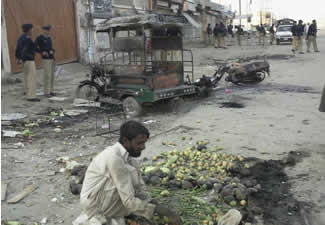|
|
|
Aftermath of the bombing in of a funeral procession in Dera Ismail Khan, Nov. 21, 2008. |
Taliban and al Qaeda-linked extremists attacked a funeral procession in Pakistan’s lawless Northwest Frontier Province.
At least ten mourners were killed and dozens were wounded after a roadside bomb detonated as the procession travelled on a road in Dera Ismail Khan, a settled district in the province. The funeral was being held for a Shia cleric named Iqbal Shah, who was “gunned down by unknown assailants on Thursday night,” the Associated Press of Pakistan reported.
The attack generated a backlash against police and local authorities. “The explosion triggered panic among people as some angry protestors moved to streets, roads and resorted to aerial firing,” the Associated Press of Pakistan reported. “They pelted stones on police outside the hospital and burnt tyres.” Police had to use teargas to break up the rioting as shops and markets closed.
Extremists in the Northwest Frontier Province carried out a similar attack this year. A suicide bomber struck at a policeman’s funeral in the settled district of Swat on Feb. 29. More than 40 Pakistanis were killed and scores more were wounded, many of them critically. The police officer and two others were killed in a suicide attack in Lakki Marwat the day prior.
Dera Ismail Khan has been the scene of several attacks on minority Shia this year. A suicide bomber wounded three Pakistanis after detonating at a Shia gathering on July 13. Four Pakistanis were killed and three wounded in a bombing at a Shia mosque on June 16. In neighboring Peshawar, a suicide bomber killed 10 and wounded 25 in an attack on a Shia mosque.
The attacks are carried out by anti-Shia terror groups such as the Lashkar-e-Jhangvi and Sipah-e-Sahaba. These groups have merged with al Qaeda in Pakistan, and are harbored by the Taliban in the tribal areas.
The Lashkar-e-Jhangvi (LeJ or Army of Jhangvi) was formed in 1996 after splitting with the Sipah-e-Sahaba, a radical Sunni group behind sectarian attacks against Shia throughout Pakistan. The Lashkar-e-Jhangvi expanded its activity to include terror attacks against the Pakistani state. After Sept. 11, 2001, LeJ was one of two Pakistani terror groups banned by the Musharraf regime.
The size of the LeJ is unknown, but it is believed to have hundreds of members dispersed in small cells throughout Pakistan. The group maintains camps in South Waziristan, under the protection of Baitullah Mehsud.
Pakistani police began to openly admit the LeJ began forging close ties with al Qaeda and the Taliban after a string of attacks during the winter and spring of 2006. The most high-profile attack was the March 3 bombing outside the US Consulate in Karachi. A US diplomat was killed in the suicide car bombing.
LeJ foot soldiers carried out the attack, while the bomb was assembled in territory controlled by Abdullah Mehsud, a Taliban leader near Wana in South Waziristan who was killed by Pakistani forces in Zhob in 2007.
“Police have come to the conclusion that terrorist groups with different priorities have ganged up,” Daily Times wrote in 2006. “They are specifically worried about the Lashkar-e-Jhangvi, Al Qaeda and the Abdullah Mehsud-led group of Afghanistan.”
Baitullah Mehsud, Abdullah’s cousin and the leader of the Movement of the Taliban in Pakistan, is known to have absorbed elements of the LeJ in Karachi and placed them under the command of a leader named Raheemullah.









4 Comments
I’m guessing it will be awhile until we hear condemnation for this attack from the rest of the world.
‘I’m guessing it will be awhile until we hear condemnation for this attack from the rest of the world.’
condemnation? Extremist sunnis have been blowing up shias for the past 5 years in Iraq and no Sunni govt., as i recall, have never condemned it.
Ali,
That is the reason i don’t hold my breath.
However, I condemn it as barbaric.
It is the true face of the enemy.
My apologies C. Jordan – I get frustrated when I see the barbarism of certain muslim extremists.
I am really proud as a Shia that we don’t retaliate with suicide bombings like these Sunni extremists. We won’t sink to their level. With the exception of Hezbollah and Iran (I think) the other Shia people never indiscriminately target civilians.
This is not the end of the attacks sadly – we have been persecuted since the battle of 680 and it will go on.